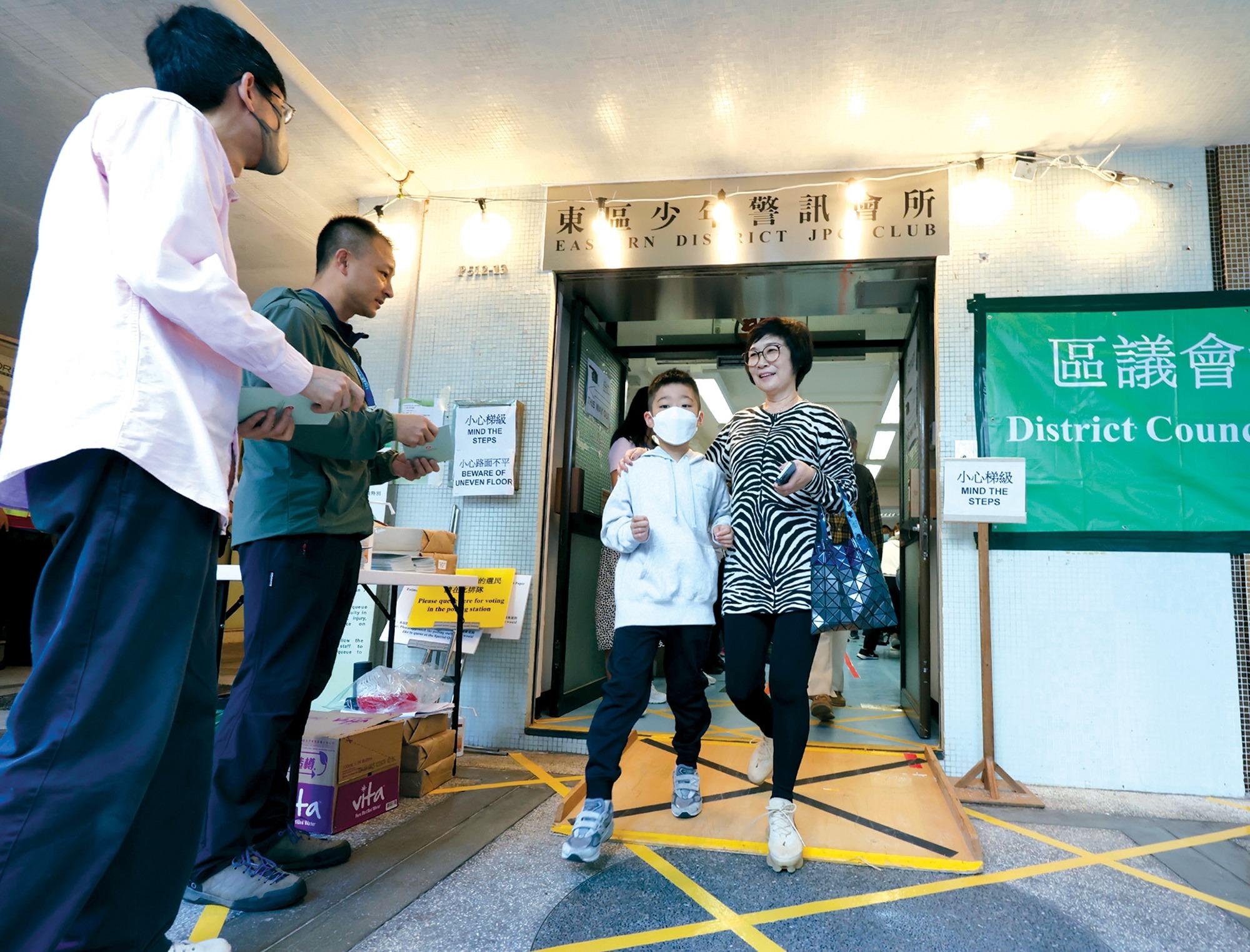 A resident brings a young family member to a polling station in the Eastern district on Dec 11, 2023. (PARKER ZHENG / CHINA DAILY)
A resident brings a young family member to a polling station in the Eastern district on Dec 11, 2023. (PARKER ZHENG / CHINA DAILY)
The Hong Kong Special Administrative Region has made significant strides this year in maintaining its long-term stability through implementing “patriots administering Hong Kong”, safeguarding national security, and strengthening patriotic education.
Political figures and educators, while commending these efforts, also called for innovative and accessible methods to engage the wider public in patriotic education.
To ensure “patriots administering Hong Kong”, the SAR government has improved the district council electoral system, with the District Councils (Amendment) Ordinance 2023 coming into effect on July 10.
READ MORE: District Council geographical constituencies results released
Under the revamped system, district councilors are selected through government appointments, constituency elections, and ex officio membership. All candidates will undergo an eligibility review to ensure their commitment to upholding the Basic Law and allegiance to the SAR.
The reform aims to restore the Basic Law’s original purpose of district councils — supporting the government in local administration — and prevent them from being subjected to political agendas.
The District Council Ordinary Election held on Sunday marks the completion of the “last mile” of the reforms. A total of 264 patriotic and capable councilors were elected to serve their District Council geographical constituencies or District Committee constituencies. Together with 179 appointed members and 27 ex officio members, the seventh-term District Councils will begin on Jan 1.
Brave Chan Yung, a Hong Kong deputy to the National People’s Congress, said the new electoral systems have proved crucial in ensuring “patriots administering Hong Kong”.
He emphasized the need to “cherish and uphold the new framework”, saying they align with the “one country, two systems” principle, are suited to Hong Kong’s realities, and meet its developmental needs.
Security still priority
In 2023, the third year since the implementation of the National Security Law for Hong Kong, the SAR government has been actively combating actions that pose threats to national security. Efforts have been made to further enhance the legal mechanism of safeguarding national security.
In the 2023 Policy Address, the government pledged to fulfill the SAR’s constitutional duty by completing local legislation related to Article 23 of the Basic Law by 2024.
Additionally, a bill will also be introduced to the Legislative Council in the coming year to address the protection of cybersecurity for critical infrastructures, such as energy, telecommunications, transportation, and financial institutions.
READ MORE: District councilors-elect vow to serve interests of residents
Boosting patriotism
In its ongoing efforts to foster a stronger sense of national identity among local residents, the HKSAR planned to continue various initiatives.
Joe Fang, research director of the One Country Two Systems Research Institute, said that these initiatives have positively affected the social atmosphere. Hong Kong residents now possess a deeper understanding of the nation’s development, and their sense of national identity continues to strengthen, he said.
According to the latest Policy Address, the government will establish a Working Group on Patriotic Education and a Chinese Culture Promotion Office in 2024.
The Hong Kong Science Museum will be converted into a museum showcasing the nation’s development and achievements. What’s more, the Chinese Culture Festival and the Hong Kong Museum of the War of Resistance and Coastal Defence have been scheduled for the coming year.
During the 2022-23 school year, a campaign organized by the city’s Education Bureau under the theme “Love Our Home, Treasure Our Country” saw participation of 65 government schools. The event was attended by over 12,000 teachers and students, who took part in various school activities aimed at enhancing their understanding of Chinese history and culture.
A youth-exclusive patriotic education foundation was established on Nov 25 to support 100 primary school students and 100 secondary school students, who will attend patriotic education programs and extracurricular activities during the first phase.
These initiatives align with the passage of the Patriotic Education Law by the Standing Committee of the National People’s Congress, China’s top legislature, on Oct 24. The law will take effect on Jan 1.
Starry Lee Wai-king, a Hong Kong member of the NPC Standing Committee, proposed diversified measures to enhance the effectiveness of patriotic education.
ALSO READ: Observers: DC polls fully demonstrate quality democracy
She suggested that the SAR government incentivize filmmakers to include patriotic elements in their productions by offering additional points for funding applications. She also advocates for the support and development of online games that serve and promote patriotism.
William Wong Kam-fai, an associate dean of the Faculty of Engineering at the Chinese University of Hong Kong, suggested that the patriotic education working group explore the use of new media, new forms and new channels.
He suggested starting with the impressive technological developments made by the nation, such as setting up permanent exhibitions. These exhibitions can use virtual reality and interactive games to attract young visitors.
Currently, the Hong Kong Science Museum and the Hong Kong Museum of History are hosting a high-level space exhibition, running through Feb 18, which showcases China’s 30 years of space exploration.


